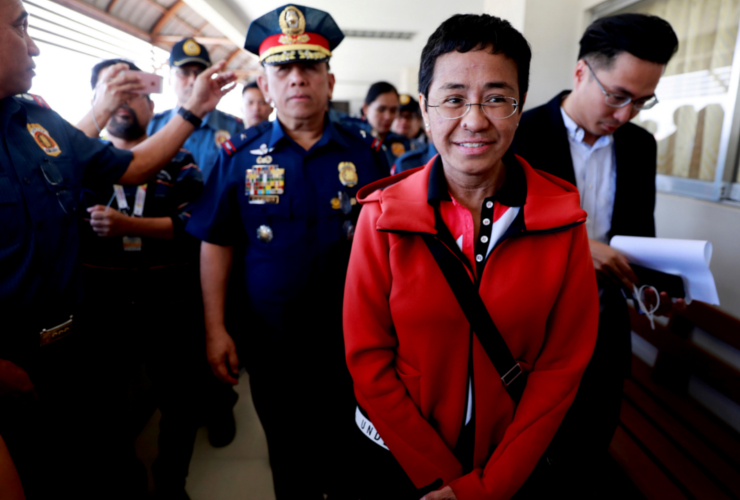International Press Institute (IPI) Executive Board member Maria Ressa, a prominent Philippine journalist and the founder of media outlet Rappler, faces a verdict in a politically motivated “cyber-libel” trial on June 15. She faces up to seven years in prison in the case.
“Whatever it is you are most afraid of, you have to touch it, hold it and embrace it. So I embrace my fear and by embracing my fear I can take the sting out because frankly it is a mix, a mix of facing great powers of the state, fear yes but also anger, that I have done nothing wrong but do my job“, Ressa said this week in a press briefing organized by IPI.
The handing down of the verdict in the Manila Regional Trial Court (RTC) Branch 46 was initially scheduled on April 3 but was postponed because of the coronavirus lockdown. In the Philippines, where very strict lockdown rules have been imposed, the country’s biggest television broadcaster, ABC-CBN, was shut down at a time when no-one could leave their homes and a controversial new anti-terror law, that could be used to target government critics, is awaiting the signature of the President Rodrigo Duterte.
Ressa says the pandemic has drastically changed the situation and she does not know what to expect on court on Monday. “The difficulty with the quarantine rules is that the number of people in the courtroom is cut down. So, the number of reporters for example who can be there is cut down to three. No observers allowed.”
Precedent defying the future
The cyber-libel trial against IPI Executive Board Member Ressa is based on an investigative report published by Rappler on May 2012. The article said that the then-chief justice of the Philippines’s Supreme Court, Renato Corona, had used vehicles belonging to a controversial businessman. The article was republished on February 2014, to correct a spelling error, which is a normal practice of news publications.
In February last year, the Department of Justice (DOJ) arrested Ressa and filed charges against her, reporter Reynaldo Santos Jr. and Rappler Inc. under the Cybercrime Prevention Act, which was enacted on September 2012, four months after the publication of the original report in Rappler. The charges stemmed from a complaint by the businessman, Wilfredo D. Keng.
According to Theodore Te, Ressa’s lawyer, the case is one of the first in The Philippines involving a journalist charged for cyber-libel. The verdict will set an important precedent for future cases.
“If the judge finds that there is basis for liability, the judge is not simply saying that the accused here committed a cyber-libel. The judge would affectively be saying that republication particularly for online medium is now an accepted fact in terms of the law”, Te said in the press briefing. “That creates serious implications for online media. Essentially, because those articles can stay online forever, that means that you can have multiple prosecutions and it never stops.”
Acquittal would end the process for good
Compared to normally slow trial processes in the Philippines, the trial against Ressa and Rappler in the cyber-libel case has moved on exceptionally fast as the judge, according to Te, was efficient and clear in the procedure. On Monday the verdict, either an acquittal or a conviction, will be read publicly.
“If it is acquittal, then it’s over”, Te explained. “What we will do in the event of conviction is to ask for bail, meaning that Maria and Rey, the two accused, should be allowed to go free on the same amount of bail that they have already posted.”
Ressa is being prosecuted in the case as CEO and executive director of Rappler, together with former Rappler researcher and writer Reynaldo Santos Jr., and Rappler as a corporate entity. If the judge concludes that the accused are responsible for republishing the allegedly defamatory article, Te said, they will challenge the verdict all the way to the Supreme Court.
Rappler has been for years a target of President Duterte, who has made false allegations against the media organization and accused it of being funded by foreign agencies seeking destabilize his government. The targeting of Rappler started in 2016 with exponential online attacks on social media and later continued with arrests and legal harassment.
At the moment, there are a total of eight cases pending against Ressa and Rappler, including three tax cases, charges for violating foreign ownership rules and an alleged violation of nationality law (“anti-dummy law”).
IPI has launched the campaign #holdtheline #mariaressa in support for Maria Ressa. The IPI Executive Board has also published a statement in solidarity with Ressa in the face of the authorities’ efforts to intimidate her and stop her from doing her job.
